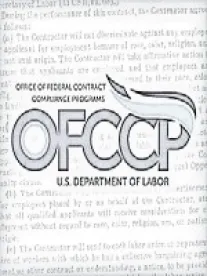In August 2018, the Office of Federal Contract Compliance Programs (OFCCP) issued Directive 2018-04, which notified contractors that it was “in the process of implementing a comprehensive initiative that seeks to ensure compliance with equal employment opportunity and anti-discrimination regulations.” Specifically, the directive identified OFCCP’s plan to conduct compliance reviews focused on one of the three authorities that OFCCP is charged to enforce: Executive Order 11246, Section 503 of the Rehabilitation Act of 1973, and the Vietnam Era Veterans’ Readjustment Assistance Act of 1974 (VEVRAA).
As promised, OFCCP has published a new scheduling letter that will notify contractors that they have been selected for focused compliance reviews pursuant to Section 503 of the Rehabilitation Act and its implementing regulations. It is expected that the Section 503–focused letters will be sent sometime after the next corporate scheduling announcement letter (CSAL) list is posted on OFCCP’s Freedom of Information Act (FOIA) Library, probably in the spring of 2019. OFCCP plans to conduct 500 of these reviews focused on Section 503 compliance at contractors’ corporate headquarters locations in fiscal year 2019.
A “focused” review is touted as being smaller in scale compared to OFCCP’s standard compliance review, which evaluates compliance with Executive Order 11246, Section 503 of the Rehabilitation Act, and VEVRAA. According to OFCCP, the proposed Section 503 scheduling letter is considered a “non-material change” to the current OFCCP Scheduling Letter and Itemized Listing, and it seeks only “approximately one-third of the information” normally requested. Proposed scheduling letters for focused reviews under Executive Order 11246 and VEVRAA have not yet appeared on the Office of Information and Regulatory Affairs’ website.
The Section 503–focused scheduling letter does not seek any new information that is not already requested by OFCCP; it just appears to focus the requests on information relevant to Section 503 obligations and recordkeeping requirements, such as:
- the current Section 503 Affirmative Action Program (AAP);
- documentation of compliance with audits, assessments (e.g., physical/mental requirements, personnel processes, and outreach and recruitment), and other reporting requirements pursuant to 41 C.F.R. § 60-741.44, including annual data collection for applicants and hires for three years;
- reasonable accommodation policies and documentation of requests granted and denied per the policies; and
- an evaluation of utilization goals for individuals with disabilities in the workforce and by job group, as required by 41 C.F.R. § 60-741.45.
Although OFCCP claims to seek less information in Section 503–focused review, it still requests comprehensive data not limited to compliance with Section 503 and its implementing regulations. For example, the Section 503–focused scheduling letter requests submission of the current Executive Order 11246 AAP, EEO-1 forms for three years, a copy of the current collective bargaining agreement (CBA), and any policy statements, employee notices, or handbooks that implement, explain, or elaborate the provisions of the CBA. These materials may contain information necessary to OFCCP’s evaluation of Section 503 compliance, such as job group information, total employment, and job descriptions/seniority/compensation dictated by the current CBA. However, this data provides enough information for OFCCP to expand its investigation if an evaluation of the non–Section 503 information identifies potential problems.
To get ready for a focused review of Section 503 compliance, you may want to carefully prepare all of your AAPs. If OFCCP is focusing on Section 503 compliance, you will need to provide a great deal of information regarding recruitment, hiring, promotion, training, compensation, and retention efforts that the company has undertaken to comply with the affirmative action regulations applicable to individuals with disabilities. Here are some other steps that contractors may wish to consider:
- Review the company’s policies on leaves of absence and reasonable accommodation requests, and be sure that compliance is consistent and adequate records are maintained for the appropriate time frames.
- By location, maintain a comprehensive list of all disability accommodation requests, including the employer’s response to each request. If an accommodation request is denied, the list should include an explanation of the reason for the employer’s decision.
- Train decision-makers on the company’s policies and the importance of engaging in an interactive process to evaluate a reasonable accommodation request. Maintain appropriate training logs and other documentation.
- Ensure compliance with OFCCP self-identification requirements for applicants, hires, and employees.
- Step up efforts to connect with organizations that service individuals with disabilities.
- Evaluate recruitment sources targeted to source-qualified individuals with disabilities to determine if they are providing qualified candidates; if they are not, reach out to others.
- Ensure that the company’s career website contains the appropriate accommodation language and provides contact information for those seeking accommodations.
- Pay special attention to the self-audit obligations of Section 503.
According to Directive 2018-04, OFCCP plans to publish FAQs on the standard protocol that will be followed by OFCCP to conduct focused reviews of Executive Order 11246, Section 503, and VEVRAA compliance. When that information becomes available, we expect that Section 503–focused review letters will soon follow.





 />i
/>i
